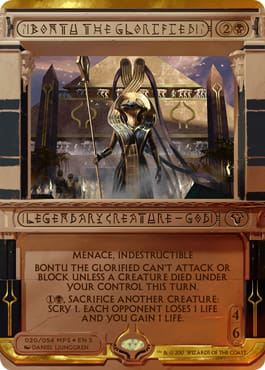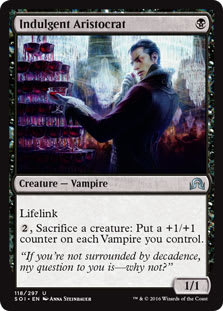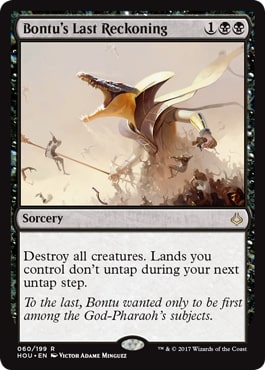It's Black. I mean, we all know that, right? And subservience is White. White is all about surrendering to a higher power! And that's when Nicol Bolas returns to Amonkhet, Bontu, the God of Ambition, decides to kneel in subservience before . . .
Wait that can't be right. Black should be all about clawing your way to the top, fighting against the odds for your desires! That's ambition, right?
Certainly that's behind recent shifts in what Black's characteristic race is. For those not familiar with the term, the "characteristic" race of a color is a kind of baseline, common creature type used to define the color. This is in contrast to "iconic" races that sit at rare, are splashier, and represent the highest sort of manifestation of the color's ideals. The now decade old design innovation saw a transition from zombies to vampires as Black's characteristic race as a logical follow-on from the idea that themes in Magic need to be present at common: if Black has ambition as a core part of its color pie, that aspect should appear at common, as iconic creatures.
Now, things have shifted somewhat since Mark Rosewater's 2009 article introducing the idea. Goblins, notably, are listed as Red's characteristic race, and we shockingly haven't seen goblins for three worlds in a row now! Still, despite the fact that what is "iconic" for one world might be cycled out in another, the basic concept has remained largely stable: the iconic races, whether vampires or aetherborn, have represented some aspect of Black's aspirations. No longer is Black incorrectly associated with the drooling, brain-craving, servile zombies, who have now been exiled forevermore to White, where they clearly always belonged.
This makes sense, of course. The mark of a Black mana user, of course, is that they will naturally tap into White mana to summon their hoard of loyal servants! . . . Hold on, that doesn't sound right either. What's going on with Black and ambition?
Black's ambition, simply put, poses a bunch of problems from a worldbuilding, design, and storytelling perspective. It's absolutely true that Black is the color of ambition! But how that quality is expressed depends pretty heavily on context!
Take the problem of the Black player, for example. Now, someone coming to the game is going to get their sense of the color from the cards, and from that perspective the switch from zombies to vampires makes a lot of sense. What better way to display Black's ambitions than to show all these vampires vying for power? It's a good introduction to Black's way of doing things, though it runs into a different problem of making Black seem inherently evil. That's a problem for another day though.
The problem it more directly poses when it comes to ambition is that it suggests the Black player/Planeswalker is best understood as the head of a criminal organization full of a bunch of cutthroats who'll sacrifice each other at a moment's notice in order to get ahead. The iconic demons or most powerful vampires here might be best thought of as minions that grow powerful enough to challenge you! You have to keep paying demons in life or in minions or they'll kill you.
Not every Black 'walker wants that kind of life, though, necessarily. Consider another possible narrative gameplay experience:
You're a ruthless autocrat. Your minions obey your every whim, whether zombies or thrulls or humans who worship your dark glory. You sacrifice them at will to further your dark schemes, and rule with an iron fist. This is just as much a Black gameplay experience as being the head of a cutthroat organization, but I think it requires different cards. The fantasy of the Necromancer isn't really accomplished through a hoard of vampire minions all jockeying for their own position of power.
This is an example of something as simple as "ambition" manifesting in some pretty different and even conflicting ways when considered in terms of narrative game design! Ambition can be totally expressed through the player, or expressed through the world depicted on the cards, or both, and some forms of ambition — aspiring to have total dominion over mindless slaves, or aspiring to have total dominion over people who are like you, who crave your level of power, and yet can never hope to topple you — do seem to be somewhat contradictory.
I don't think this is a problem in need of resolution so much as one of the nuances to Magic's design that will cause settings to go in different directions. We haven't actually left Black zombies behind at all, of course, all jokes aside! The White zombies of Amonkhet are willing servants to be sure, but they're willing servants of the community. The dead affected by the Curse of Wandering are slavering hoards whose control can be seized by any powerful necromancer, and the Eternals are, of course, the mindless thralls of Nicol Bolas. Mindless servants of a sadistic Planeswalker with god aspirations are, it turns out, still very Black! Meanwhile, the other various considerations that go into worldbuilding have meant that on some worlds we've seen neither vampires NOR zombies, with ambitious hunger and mindless hunger replaced with the short lived hedonism of the Aetherborn, and on others we've seen BOTH, demanded by the traditions of gothic horror.
What this complex gameplay instantiation of the color pie helps us see is how complex Black's aspirations are in practice. I think this helps explain how Bontu ended up siding consciously with Nicol Bolas.
Consider this passage from the story "Favor":
Hazoret recognizes, in Bontu's laugh, desperation and sadness. It's clear that it's simply not in Bontu's nature to bow to Nicol Bolas, or to anyone. But the fact of the matter is that Bolas arrived on Amonkhet and within a brief amount of time had massacred the population, killed three gods, enslaved the others, and remade the plane's culture in his image. Bontu's subservience has nothing to do with a natural inclination for subservience and everything to do with a bitter calculus of survival. It is Bontu's ambition, ultimately, to survive the end of the world.
I've seen claims that Bontu should have, being ambitious, found a way to get the best of Nicol Bolas. That's certainly a story about ambition that one could tell — and we've certainly received more heroic stories of ambition in the past. Liliana, for example, constantly seeks freedom from the demons she made contracts with — though, notably, it's quite in her character as a Black mage to have made those contracts, submitting to demonic powers in the name of personal gain. Xantcha is motivated to serve Urza in order to gain a greater power over Phyrexia, and eventually over her oppressor Gix. Yahenni's aspirations to live and die fabulously are curtailed by the Consulate, and they embrace their vampiric abilities and joins a revolution just long enough to have a really rad death party. You know. It's not as though there's no stories of Black ambitions translating to heroic action.
But that's not this story, and that's ok! Not only is it ok, it's pretty interesting, because it shows how the very ambitious nature of Black can manifest as its apparent opposite. Bontu serves Nicol Bolas because she believes she can be first among his new order. But Nicol Bolas no longer needs living gods. Bontu gambled here and lost, and there's something compelling I think in that narrative, one where a Black character makes the wrong choice in the name of ambition, plays the odds, and gets cozy with power, only to have that power turn around and discard her when her usefulness is over. Ambition in Black is fascinating not just because of the way it interacts in twists and turns with its counterpoint, subservience, but because there is so much danger in that dance, so much chance for the Black mage to make a misstep.
In a way, Bontu's actions might be seen as a twisted counterpoint to her siblings. The other gods have faith in their God-Pharaoh . . . Bontu only has faith that she can be useful to Nicol Bolas. She seems truly convinced that she can prove herself worthy of standing by Bolas's side, and she recognizes, rightly, that she cannot stand directly against him with her siblings.
The faith of the other gods of Amonkhet in another power was ultimately betrayed. It is darkly fitting that what Bontu, the God of Ambition, found betrayed was not her faith in Nicol Bolas, but her faith in her own worth, her confidence that her ambitions would let her survive the end of the world.


























